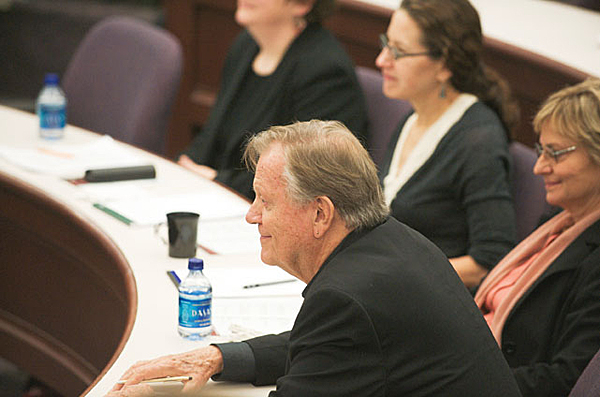In Review
 FOCAL POINT: Hayden White, a former chair of Rochester’s history department, listens to a presentation during a two-day colloquium focused on his work. The event took place this spring as part of the Humanities Project (Photo: Richard Baker).
FOCAL POINT: Hayden White, a former chair of Rochester’s history department, listens to a presentation during a two-day colloquium focused on his work. The event took place this spring as part of the Humanities Project (Photo: Richard Baker).Why do we write history?
If you had asked the question in a college history classroom 50 years ago, the chances are good that the professor and students alike would have cited the need to show how our society came to be as it is, or the need to extract lessons from the past.
Both responses assume historians can portray the past as it truly was. But can they?
Hayden White, a former chair of Rochester’s history department who taught at the University from 1958 to 1968, raised just that question—first, in a 1966 essay called “The Burden of History,” and in 1973 in a book, Metahistory, that established his place as one of the most provocative thinkers in the humanities in the past 40 years.
In April, White, who now teaches at Stanford University, returned to the River Campus for a celebration of his work—and his 80th birthday.
“Between History and Narrative: Colloquium in Honor of Hayden White” was a two-day event carried out as part of the Humanities Project, a series of lectures, exhibitions, panel talks, and other initiatives designed to showcase, and share with the public, the work of Rochester faculty in the humanities. Twelve Rochester faculty members from six disciplines joined scholars from across the United States, Britain, the Netherlands, and Poland in presenting papers that reflected White’s influence in the fields of art history, literature, visual culture, and history. Robert Doran, an assistant professor of French who joined Rochester’s faculty last fall, organized the event with the help of colleagues in the modern languages, English, and history departments. Doran studied under White at Stanford and is the editor of a forthcoming book of White’s essays.
John Michael, the chair of Rochester’s English department, remembers the excitement he felt when he discovered White’s work in the late 1970s. “It was stunning,” he says. “In looking at the great 19th-century historians, what White focused on was not what they had to say about the French Revolution, or the history or future of class struggle. He focused on the way in which they developed narrative structures to tell their story,” Michael says. “Those turned out to be very similar to the forms of the novel.”
White argued that in amassing historical information and organizing it into a narrative, historians followed well-established modes of storytelling. This process of “emplotment,” as he called it, necessarily shaped historical content in ways that made any given account a reflection of the author’s interests and concerns.
White has had plenty of critics who, he says, have called his work “dangerous, nihilistic, anarchistic,” and “relativistic.” But, he concludes, such critics find his work “dangerous usually to their ideas.”
“[P]hilosophy of history—or critical historical thinking—which is what I do is concerned with such questions as Why are we doing this? What should we be doing? How can we know what we ought to do in this situation, here and now? Historical inquiry—among other things—looks into the ways in which people like ourselves in different times and places and other circumstances answered such questions.”
Some critics still want “certainty” in history, White concedes. But, he adds, “there is no certainty in human affairs.”
“Mankind is always in the process of inventing itself anew—always therefore ‘revising’ itself and along with that, revising its history of itself. To think of history this way is to return it to its place among the humanities, where it should reside content with knowing only something, not everything.”
